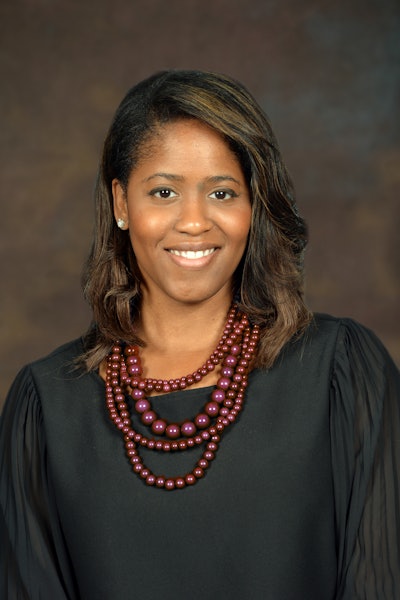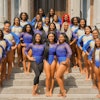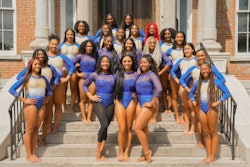The latest report card from The Institute for Diversity and Ethics in Sport (TIDES) gives Football Bowl Subdivision (FBS) schools an F for gender hiring, but improvement may lay ahead.
“The 2020 DI Football Bowl Series College Racial and Gender Report Card: The Lack of Diversity within Collegiate Athletic Leadership Continues” made clear that despite some improvement over the past year in racial and gender categories, the 130 FBS institutions continue to show underrepresentation of women and people of color in campus leadership positions. FBS schools received a B- for racial hiring practices and an F for gender hiring practices. This resulted in an overall grade of D+.
 Sherryta D. Freeman
Sherryta D. FreemanFor the report card, the leadership positions examined include college and university presidents and chancellors, athletic directors and faculty athletic representatives as well as head football coaches and assistant coaches. The report indicates that White people hold 327 (82%) of the 399 campus leadership positions reported in the study.
“If there are no people of color or women at the top decision-making positions, then they are going to be less aware and less sensitive to the need to include candidates of color as an ongoing priority,” said Dr. Richard E. Lapchick, director of TIDES and lead author of the report.
“Those leaders, particularly presidents, chancellors and athletic directors, have to have that consciousness in mind,” he added. “The reason we keep doing this report is we want to show that the lack of diverse leadership in the highest ranks of colleges and universities results in the small number of coaches of color and staff within athletic departments.”
Three additional women were hired as athletic directors in 2020, which is a 2.3% increase over 2019, but men still hold 118 of the 130 athletic director positions at FBS schools.
African American men made up only 10% of head football coaches while African American student-athletes were 48.5% of the players. Overall, 61.6% of football student-athletes were men of color.
On the positive, the number of women in the faculty athletic representative position increased to a record-high 40.3%, which led to a grade of B+ for gender. The number of people of color in this position received a grade of B. There was an increase in the number of presidents or chancellors of color, which led to a grade of B.
The report noted that the overrepresentation of White males at FBS institutions impacts the opportunities, or lack thereof, for women and people of color.
“I don’t think we see a lack of women because there are not qualified women,” said Sherryta D. Freeman, director of athletics at Lafayette College, a Division I FCS institution. “It’s more so in the eyes of the hiring managers a lack of confidence…that women can oversee football or that women can be able to oversee the head football coach. That’s definitely not true.
 Dr. Richard E. Lapchick
Dr. Richard E. Lapchick“We’ve done the work; we’ve prepared ourselves,” she added. “It’s just a matter of being hired by someone who believes in you. … Leadership is not based on gender.”
Freeman spent a decade of her career at Temple University, an FBS school, where she rose to senior associate athletic director. She said there need to be women in leadership positions across an athletic department so women can be positioned and exposed to football programs at a high level of detail, as she was at Temple. She said that she received mentorship and sponsorship throughout her career, which have been crucial, and she now mentors others.
The NCAA adopted The Pledge and Commitment to Promoting Diversity and Gender Equity in Intercollegiate Athletics in September 2016, but it is not binding and carries no sanctions. Despite this, Lapchick remains optimistic.
“This year, from my perspective, is different,” Lapchick said. “In the wake of the racial reckoning after the murders of George Floyd and Breonna Taylor, I think the public has become more conscious.”
Lapchick has spoken to several conferences about racism in American sport. For the first time, he was asked to do a conference-specific race and gender report card, which came from the West Coast Conference. He worked together with the conference to create and implement something they’re calling the Russell Rule, akin to the NFL’s Rooney Rule that requires teams to interview ethnic minority candidates for head coaching and senior leadership positions.
“I’ve been asking the NCAA to do this since 2007, and they’ve always said it’s not possible,” said Lapchick. “It’s now on the agenda of their Board of Directors meeting on Jan. 13 because their DEI (diversity, equity and inclusion) committee proposed they consider the Russell Rule as the model policy for college sport. If that happens, we’re going to see a breakthrough.
“What else is happening this year is the whole issue of athlete activism,” he continued. “Student-athletes, while they focus on racism in society are going to turn inward and look at their own athletic departments and put pressure there so that those departments will understand they really have to have a diverse pool of candidates.”



















